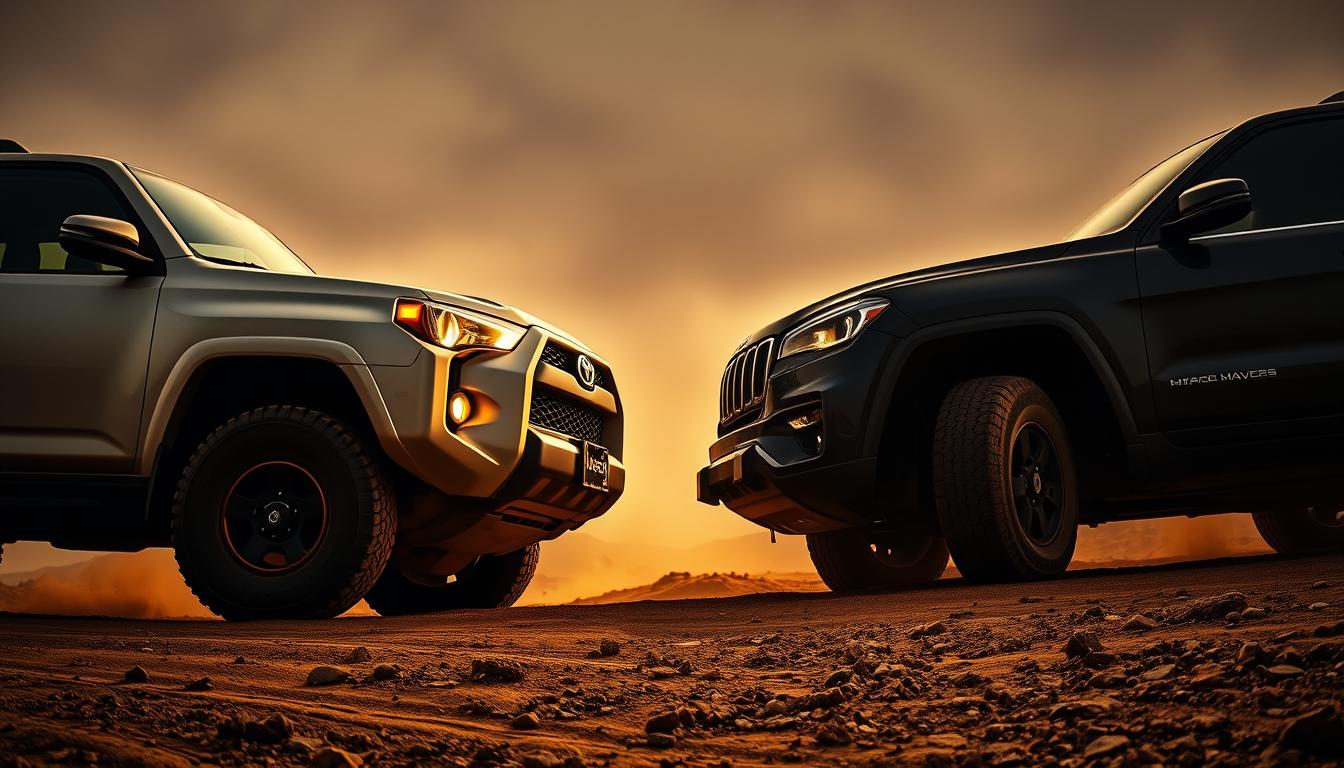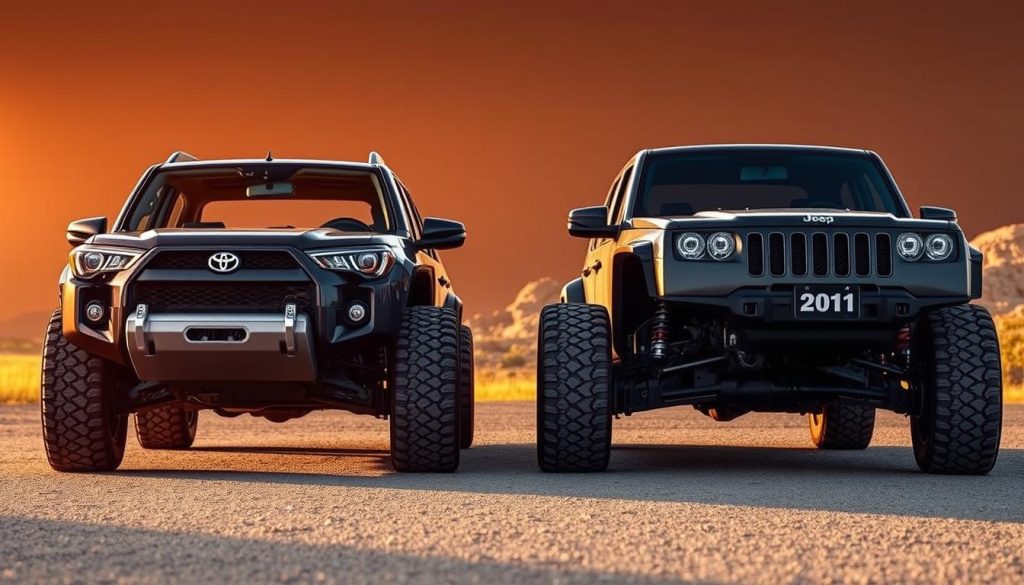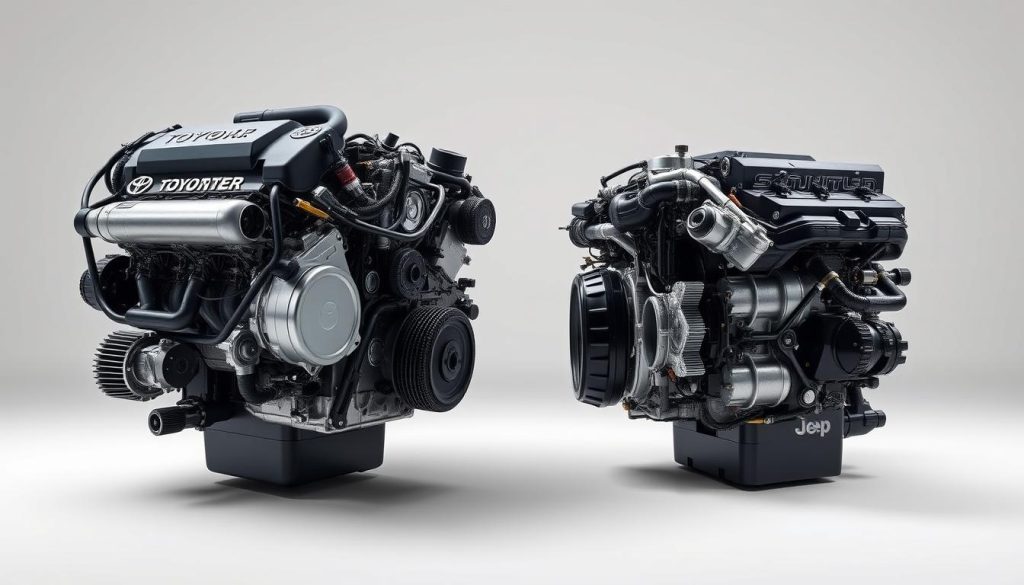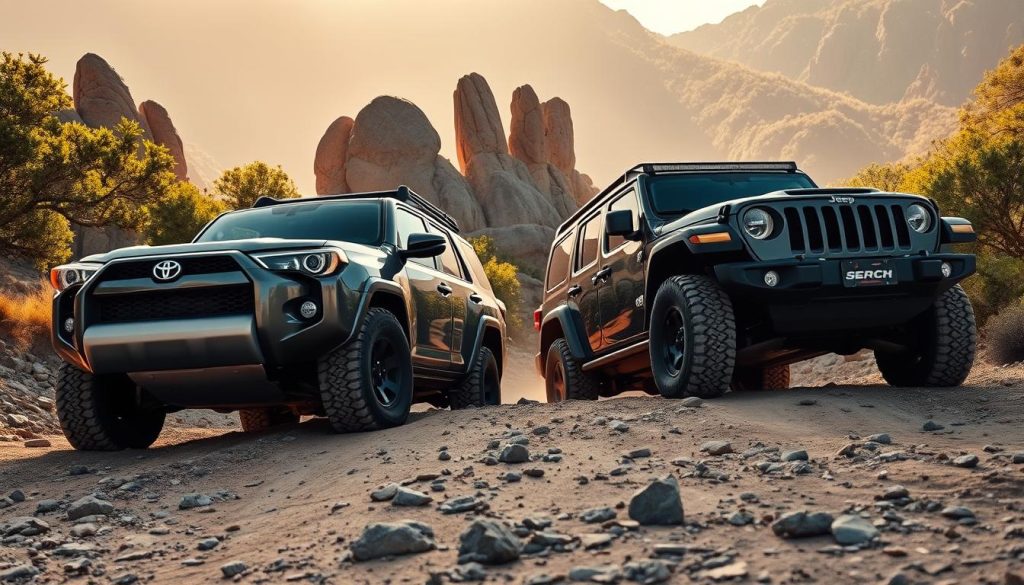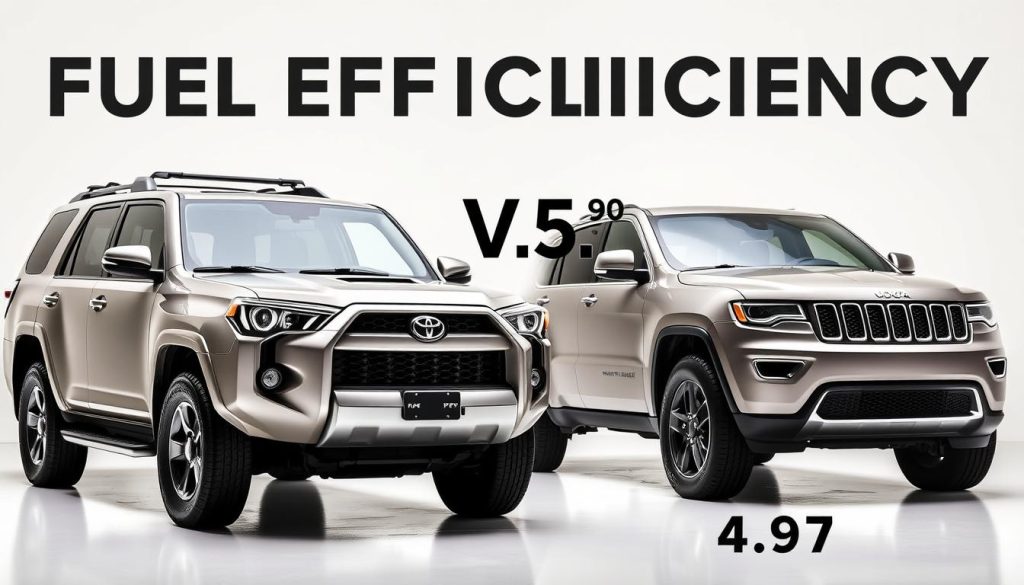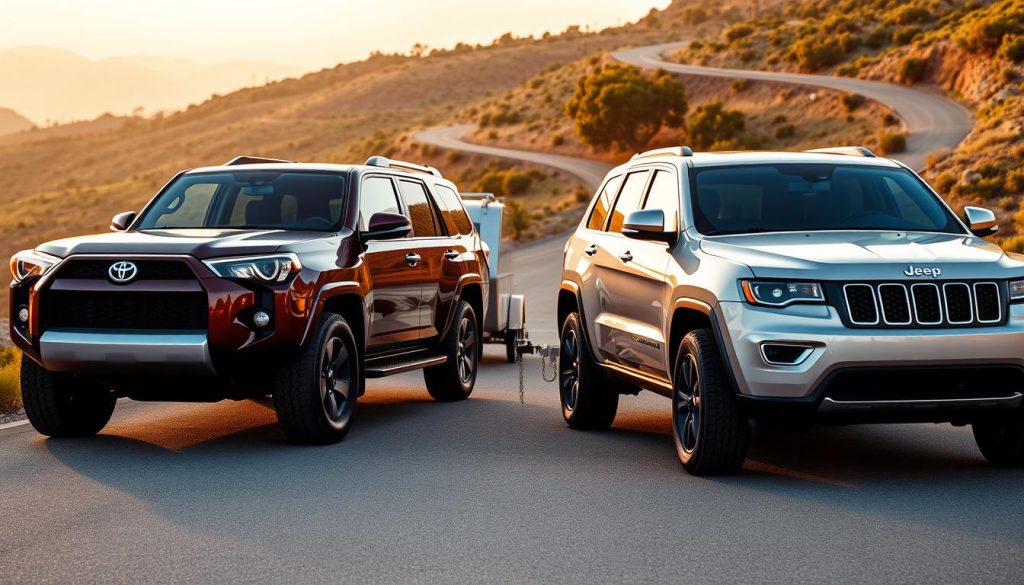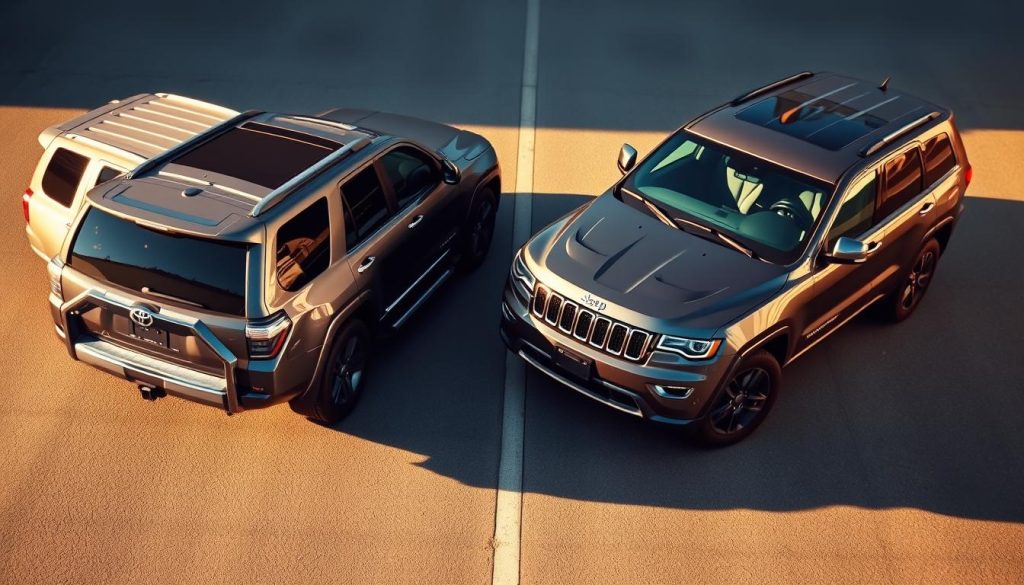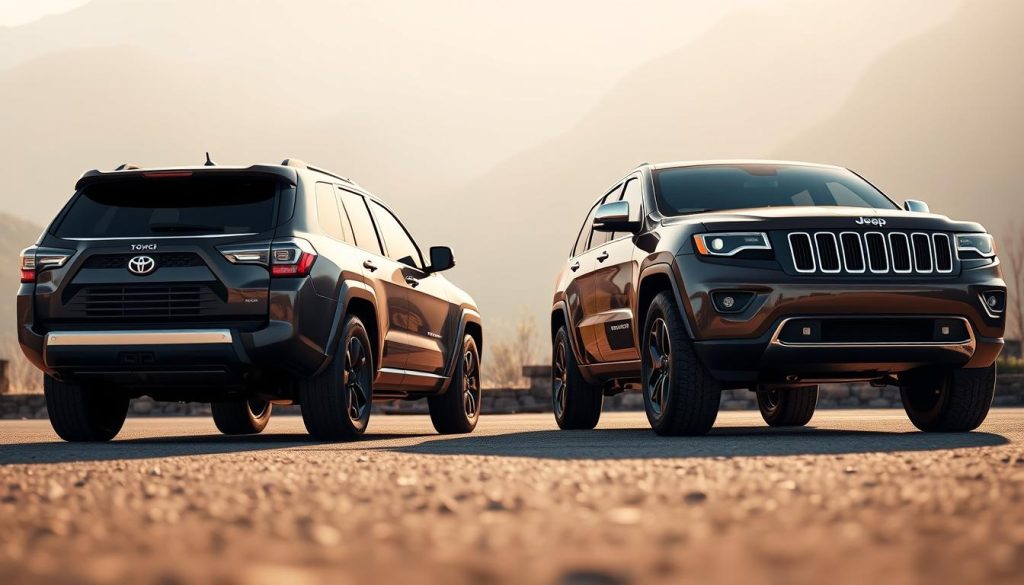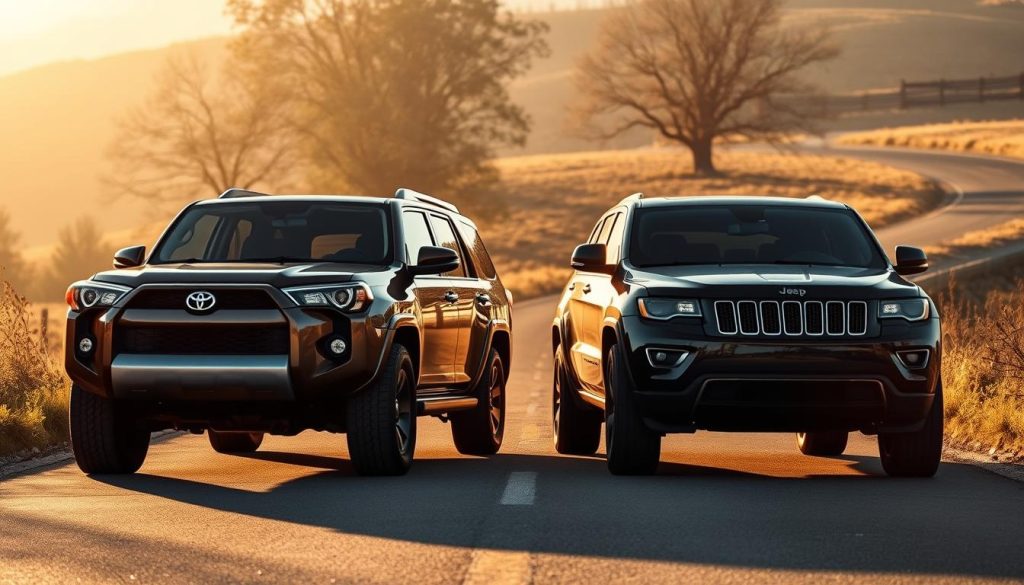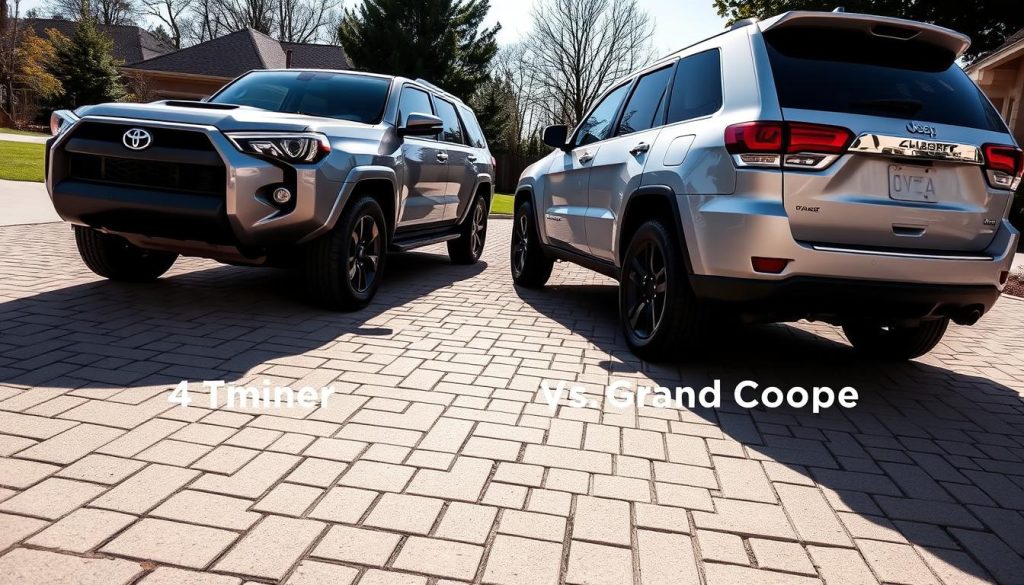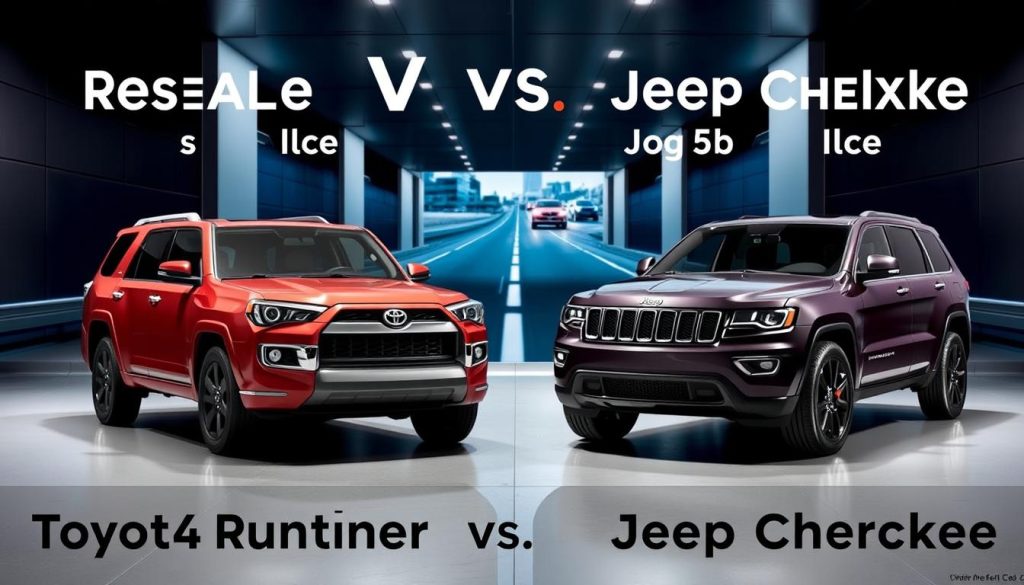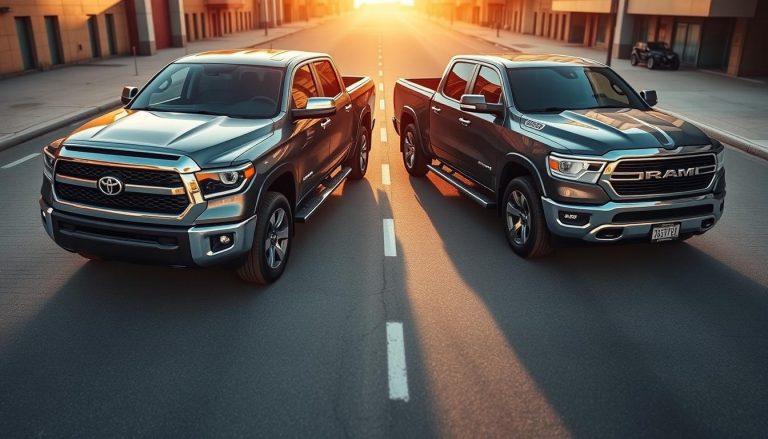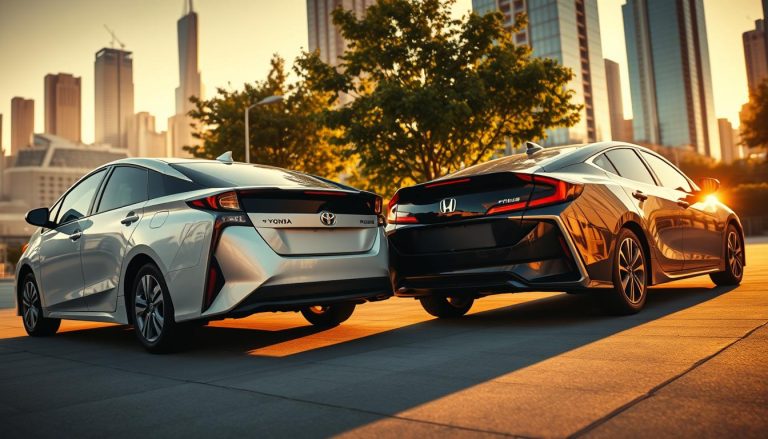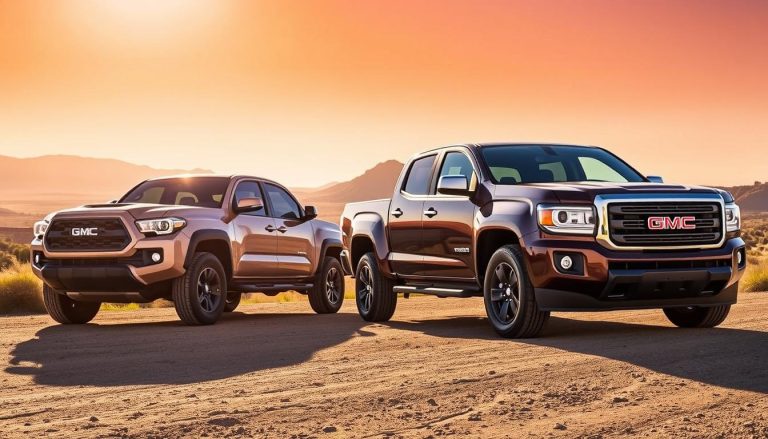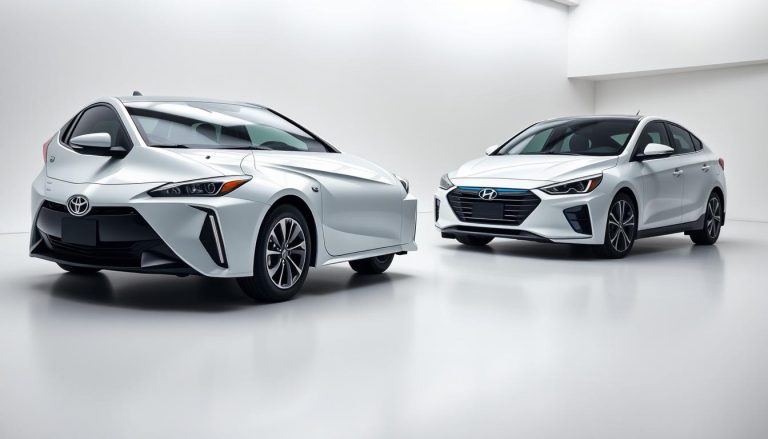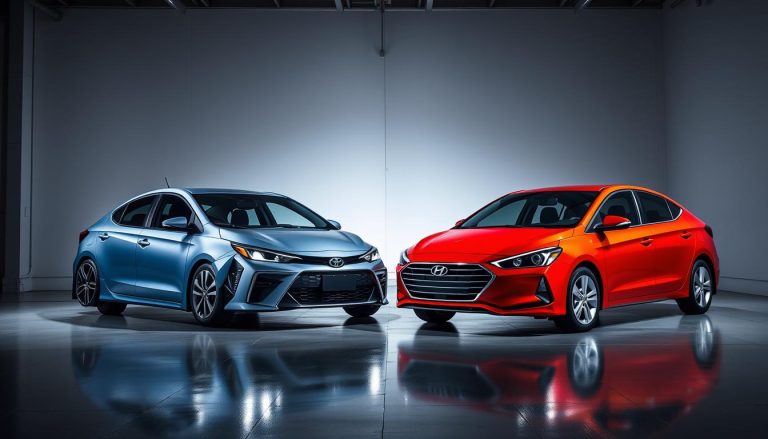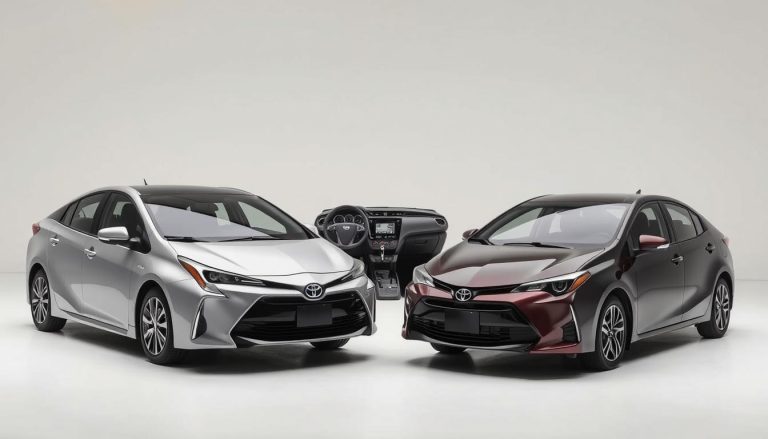Toyota 4Runner vs Grand Cherokee: SUV Battle
Two legendary SUVs are ready to face off: the Toyota 4Runner and Jeep Grand Cherokee. These rugged vehicles are top choices for off-road adventures and family needs across the U.S.
The 4Runner vs Grand Cherokee comparison shows two different SUV designs. Toyota is known for its reliability and off-road strength. Jeep, on the other hand, offers legendary off-road skills with a touch of luxury. Both vehicles are perfect for those who want more than just a car.
Choosing between the 4Runner and Grand Cherokee is not just about specs. Toyota’s body-on-frame design is traditional, while Jeep’s unibody design is modern. This comparison will highlight the strengths of each model.
We’ll dive into the key features of these popular SUVs. This will help you decide which one fits your lifestyle and driving needs. Whether you’re looking for weekend fun or daily reliability, this comparison will give you the insights you need.
Legacy and Evolution of Both SUVs
The 4Runner vs Grand Cherokee rivalry is a captivating story of two iconic SUVs. They have greatly influenced the American car market. Each SUV brought unique qualities that shaped their brands for years.
The Toyota 4Runner and Jeep Grand Cherokee have interesting beginnings. They started as tough, practical vehicles. But over time, they changed to meet new needs and tech.
Grand Cherokee’s Generational Transformation
Jeep launched the Grand Cherokee in 1993. It quickly became a top SUV known for its versatility. The Grand Cherokee has gone through five major updates:
- First Generation (1993-1998): Compact and revolutionary design
- Second Generation (1999-2004): Enhanced comfort and technology
- Third Generation (2005-2010): More refined interior space
- Fourth Generation (2011-2021): Advanced safety features
- Fifth Generation (2022-Present): Modern connectivity and electrification
4Runner’s Enduring Off-Road Legacy
The Toyota 4Runner started in 1984 as a compact pickup-based SUV. It has always focused on off-road skills, unlike many others.
Platform Developments Over Time
Both SUVs have seen big changes in their platforms. They’ve worked on making the interior bigger, the structure stronger, and the performance better. The rivalry between the 4Runner and Grand Cherokee has pushed for constant improvement in design, tech, and driving experience.
| Generation | 4Runner Key Features | Grand Cherokee Key Features |
|---|---|---|
| 1st Generation | Rugged truck-based design | Unibody construction |
| Current Generation | Advanced off-road technologies | Luxury-oriented platform |
The ongoing changes in these SUVs show their ability to adapt. They keep meeting driver needs in a changing car market.
Body Construction and Design Philosophy
The body of an SUV is key to its performance, durability, and how well it handles off-road. The Toyota 4Runner and Jeep Grand Cherokee show two different ways to design a vehicle. These designs greatly affect how the vehicle drives.
The Toyota 4Runner has a traditional full ladder-frame construction. This design focuses on being tough and great for off-road adventures. It’s strong and durable, making the 4Runner a top choice for those who love exploring rough terrain.
- Ladder-frame construction offers enhanced structural rigidity
- Designed for maximum durability in extreme conditions
- Provides superior ground clearance for off-road driving
The Jeep Grand Cherokee, on the other hand, uses a unitized body structure. This design aims to mix off-road skills with on-road comfort. It allows for more interior space and a smoother ride, while keeping the vehicle versatile.
| Construction Type | Toyota 4Runner | Jeep Grand Cherokee |
|---|---|---|
| Frame Design | Full Ladder Frame | Unitized Body |
| Primary Strength | Off-road Durability | On-road Comfort |
| Interior Space Efficiency | Traditional Layout | Optimized Design |
Each design reflects the maker’s philosophy, meeting different needs and preferences. The 4Runner’s design is for those who love the raw power of off-road driving. The Grand Cherokee is for those who want a smoother ride but don’t want to give up on versatility.
4Runner vs Grand Cherokee: Direct Comparison
When we compare the Toyota 4Runner and Jeep Grand Cherokee, we see their unique qualities. These SUVs stand out in off-road skills and design. Each has its own strengths.
Size and Dimensional Breakdown
The 4Runner and Grand Cherokee have different sizes. This affects how they perform and what they can carry. Let’s look at the key differences:
- Grand Cherokee: Slightly wider body design
- 4Runner: Longer and taller overall dimensions
- Grand Cherokee: Longer wheelbase by approximately 5 inches
Ground Clearance Insights
Ground clearance is key for off-road adventures. The 4Runner has 1.5 inches more ground clearance than the Grand Cherokee. This gives it an edge on tough terrain.
Body Structure Variations
The body structure of each SUV shows its design focus. The 4Runner is built for toughness, while the Grand Cherokee focuses on a smooth ride. These choices affect how they handle and perform off-road.
| Characteristic | Toyota 4Runner | Jeep Grand Cherokee |
|---|---|---|
| Length | 191.3 inches | 189.3 inches |
| Width | 75.8 inches | 77.5 inches |
| Height | 72.0 inches | 70.8 inches |
| Ground Clearance | 9.0 inches | 7.5 inches |
These differences make the 4Runner vs Grand Cherokee debate interesting. It shows how design choices meet different needs and challenges.
Engine Performance and Power Delivery
The 4Runner vs Grand Cherokee matchup shows different engine approaches. Toyota’s 4Runner has a strong 4.0-liter V6 engine. It gives steady power in all driving situations. This engine makes 270 horsepower and 278 lb-ft of torque, showing it’s reliable and durable.
Jeep’s Grand Cherokee has a different strategy with its engines. You can pick from several engine options:
- Standard V6 engine with balanced performance
- Powerful V8 for maximum output
- Plug-in hybrid variant for enhanced fuel efficiency
Fuel efficiency is key in this SUV comparison. The 4Runner focuses on simple performance. But the Grand Cherokee offers more choices. The plug-in hybrid is an eco-friendly alternative for those who want to save on fuel.
Performance lovers will like the Grand Cherokee’s engine variety. It suits different driving needs. Whether you’re driving in the city or off-road, these engines adapt to your lifestyle.
Choosing between the 4Runner and Grand Cherokee depends on your specific performance requirements and driving style.
Interior Space and Comfort Features
When looking at the 4Runner vs Grand Cherokee, interior space is key. Both SUVs have their own way of making passengers comfortable. They meet different needs and tastes.
Passenger Room Measurements
The design inside these SUVs shows two different views. The Toyota 4Runner has lots of room for the driver’s legs, great for tall people. The Jeep Grand Cherokee, on the other hand, focuses on comfort for those in the back.
| Measurement | Toyota 4Runner | Jeep Grand Cherokee |
|---|---|---|
| Front Legroom | 41.7 inches | 40.3 inches |
| Rear Legroom | 32.9 inches | 38.2 inches |
| Headroom (Front) | 39.3 inches | 38.7 inches |
Cargo Capacity Comparison
The cargo space is where these SUVs really differ. The 4Runner has an impressive 89.7 cubic feet of space, way more than the Grand Cherokee’s 68.3 cubic feet.
- 4Runner offers more vertical cargo space
- Grand Cherokee provides more refined storage solutions
- Both SUVs feature fold-flat rear seats
Seating Configuration Options
Modern SUVs are all about being flexible. The 4Runner usually has a three-row setup. The Grand Cherokee, though, goes for a premium two-row layout with top-notch comfort.
“Space isn’t just about dimensions—it’s about how the interior works for your lifestyle.” – Automotive Design Expert
So, the choice between these SUVs depends on what you need. The 4Runner is all about practicality. The Grand Cherokee, on the other hand, is about luxury and comfort.
Off-Road Capabilities and Features
Adventure seekers often look at the Toyota 4Runner and Jeep Grand Cherokee. These SUVs are built for tough terrains. The 4Runner vs Grand Cherokee showdown is exciting, showing both vehicles’ impressive off-road skills.
The Toyota 4Runner is known for its tough off-road features. The TRD Pro and TRD Off-Road trims are top choices. It has:
- Kinetic Dynamic Suspension System (KDSS)
- Multi-terrain select modes
- Crawl control technology
- Skid plates for underbody protection
The Jeep Grand Cherokee, in the Trailhawk trim, also excels off-road. It has:
- Quadra-Drive II 4×4 system
- Selec-Terrain traction management
- Optional air suspension
- Advanced hill descent control
| Feature | Toyota 4Runner | Jeep Grand Cherokee |
|---|---|---|
| Ground Clearance | 9.0 inches | 8.6 inches |
| Approach Angle | 33 degrees | 29.8 degrees |
| Water Fording Depth | 27.5 inches | 24 inches |
The 4Runner has a slight edge in off-road performance. Its body-on-frame design and off-road trims make it a top choice for adventure.
It’s important to test drive both SUVs. This way, you can see which one fits your off-road needs best.
Technology and Entertainment Systems
The 4Runner vs Grand Cherokee battle heats up when we look at their tech features. Both SUVs offer top-notch tech for today’s drivers. They focus on connectivity and safety.
https://www.youtube.com/watch?v=gn1ZM9rmHKE
Infotainment Features
These SUVs offer unique entertainment experiences. The Toyota 4Runner has a strong infotainment system with:
- 8-inch touchscreen display
- Apple CarPlay and Android Auto integration
- JBL premium sound system
The Jeep Grand Cherokee has its own Uconnect 5 system. It includes:
- 10.25-inch high-resolution display
- Wireless smartphone connectivity
- Advanced navigation capabilities
Driver Assistance Technologies
Safety features set these SUVs apart. The Toyota 4Runner has Toyota Safety Sense. It includes:
- Pre-collision warning
- Lane departure alert
- Dynamic radar cruise control
The Grand Cherokee has even more tech. It includes semi-autonomous driving and adaptive cruise control.
Connectivity Options
Today’s drivers want easy connectivity. Both SUVs offer:
- Bluetooth wireless technology
- USB charging ports
- Optional Wi-Fi hotspot
“Technology transforms the driving experience, making every journey more connected and convenient.” – Automotive Technology Expert
In the end, the 4Runner vs Grand Cherokee tech showdown shows two strong systems. They meet different driver needs and tech wants.
Fuel Efficiency and Economy
When we look at fuel efficiency between the Toyota 4Runner and Jeep Grand Cherokee, big differences show up. These differences affect how much money you’ll spend over time.
The Grand Cherokee has better fuel economy options. It includes:
- Standard 3.6-liter V6 with improved fuel efficiency
- Plug-in hybrid variant with exceptional electric range
- Multiple driving modes to optimize fuel consumption
The Toyota 4Runner, on the other hand, has a strong 4.0-liter V6 engine. It focuses on performance, not fuel efficiency. So, it gets fewer miles per gallon than the Grand Cherokee.
| Vehicle | City MPG | Highway MPG | Combined MPG |
|---|---|---|---|
| Toyota 4Runner | 16 | 19 | 17 |
| Jeep Grand Cherokee | 19 | 26 | 22 |
Fuel efficiency is key for SUV buyers watching their budget. The Grand Cherokee’s design to use less fuel makes it a winner in this comparison.
Smart drivers know that fuel economy impacts both environmental responsibility and long-term vehicle ownership costs.
Towing Capacity and Utility Features
When looking at the 4Runner vs Grand Cherokee, towing capacity is key for those who need to haul a lot. These SUVs have unique benefits for serious hauling needs.
Maximum Towing Ratings Breakdown
The towing capacity of these SUVs varies a lot. The Toyota 4Runner can tow up to 5,000 pounds. But the Jeep Grand Cherokee can tow even more:
- V6 Engine: Up to 6,200 pounds
- V8 Engine: Maximum 7,200 pounds
Cargo Management Innovations
Both SUVs are great at managing cargo, but they do it differently. The Grand Cherokee has more advanced features for hauling:
- Advanced integrated trailer brake controllers
- Precision trailer sway control
- Flexible cargo management systems
| Feature | 4Runner | Grand Cherokee |
|---|---|---|
| Base Towing Capacity | 5,000 lbs | 6,200 lbs |
| Max Towing Capacity | 5,000 lbs | 7,200 lbs |
| Trailer Brake Control | Standard | Advanced |
“Towing isn’t just about raw power—it’s about confidence and control.” – Automotive Expert
For those who need to tow a lot, the Grand Cherokee is a better choice. It has higher towing ratings and more advanced features for hauling.
Safety Features and Ratings
When we look at the Toyota 4Runner and Jeep Grand Cherokee, we see two SUVs focused on safety. They use advanced tech and strong designs to keep passengers safe.
The Toyota 4Runner has its famous Toyota Safety Sense suite. It includes important safety features like:
- Pre-Collision System with Pedestrian Detection
- Dynamic Radar Cruise Control
- Lane Departure Alert
- Automatic High Beams
The Jeep Grand Cherokee also has a full safety package. Its safety features give drivers confidence with new technologies such as:
- Blind-Spot Monitoring
- Forward Collision Warning
- Adaptive Cruise Control
- Night Vision Camera System
Both SUVs get high safety ratings from the National Highway Traffic Safety Administration (NHTSA) and Insurance Institute for Highway Safety (IIHS). These ratings show how well each SUV protects its occupants.
“Safety isn’t an option—it’s a standard” – Automotive Safety Expert
How a vehicle is built is key to its safety. The 4Runner and Grand Cherokee use strong steel and special crumple zones. These help spread out the force of a crash, keeping people inside safe.
Price Comparison and Value Proposition
When looking at the 4Runner vs Grand Cherokee, price is key. These SUVs offer different values, with prices that show their unique features and market spots.
Base Model Pricing Breakdown
The starting prices of these SUVs give us clues about their market strategies. The Toyota 4Runner starts at about $38,805, while the Jeep Grand Cherokee begins at around $37,390. This small price gap hides the deeper value each offers.
| Model | Base Price | Mid-Trim Price | Top Trim Price |
|---|---|---|---|
| Toyota 4Runner | $38,805 | $45,215 | $52,120 |
| Jeep Grand Cherokee | $37,390 | $43,695 | $49,860 |
Trim Level Cost Analysis
Interior space and features greatly affect prices in different trim levels. The 4Runner has trims for off-road fans, while the Grand Cherokee focuses on luxury.
- 4Runner TRD trims offer exceptional off-road capabilities
- Grand Cherokee provides more premium interior configurations
- Used market prices show different depreciation rates
Think about long-term costs when buying. Used late-model 4Runners usually sell for $45,000 to $50,000, while Grand Cherokees go for about $35,000 to $40,000.
Reliability and Long-Term Ownership
When looking at the 4Runner vs Grand Cherokee, reliability is key. Toyota’s 4Runner is known for its durability. It performs well on tough terrains and daily drives.
The 4Runner’s reliability comes from several things:
- Body-on-frame construction gives it strong structure
- Proven mechanical systems with few complex electronics
- Toyota’s known engineering quality
Jeep’s Grand Cherokee has a different reliability story. It has advanced tech but a more complex unibody design. This means it needs more care to keep it running well.
| Reliability Metric | Toyota 4Runner | Jeep Grand Cherokee |
|---|---|---|
| J.D. Power Reliability Rating | Great (2019-2023) | Average (2019-2023) |
| Average Annual Maintenance Cost | $489 | $666 |
| Expected Lifespan | 300,000+ miles | 200,000 miles |
When thinking about owning one for a long time, these reliability metrics are important. The 4Runner’s off-road skills and durability make it great for those who love adventure.
Available Trim Levels and Packages
The 4Runner vs Grand Cherokee competition gets intense when looking at their trim levels and packages. Both SUVs have a wide range of options. They cater to different driver tastes and off-road needs.
Toyota 4Runner trim levels offer great variety for those who love adventure:
- SR5: The basic model with good standard features
- TRD Off-Road: Better for tough terrain
- TRD Pro: The top off-road package
- Limited: Luxury-focused trim with high-end amenities
Jeep Grand Cherokee also has impressive trim options:
- Laredo: The entry-level trim with key features
- Limited: A mid-range option with sophistication
- Trailhawk: A special off-road variant
- Summit: The high-end luxury trim
The Trailhawk and TRD Pro models stand out in off-road performance. They offer special suspension, more ground clearance, and strong drivetrain options. These are perfect for serious outdoor lovers.
“Choosing the right trim is about matching your lifestyle with the vehicle’s strengths.” – Off-Road SUV Experts
Buyers can also add optional packages to their 4Runner vs Grand Cherokee. These packages focus on technology, comfort, and performance upgrades. They let drivers make their SUV their own while keeping the vehicle’s core strengths.
Resale Value and Depreciation
When looking at the 4Runner vs Grand Cherokee, resale value is key. Toyota’s 4Runner stands out for keeping its value well in the SUV market.
The 4Runner’s great resale comes from several things:
- Legendary Toyota reliability
- Strong off-road capabilities
- Robust build quality
- Dedicated enthusiast community
On the other hand, the Grand Cherokee loses more value. Studies show the 4Runner keeps 60-65% of its value after five years. The Grand Cherokee, though, only keeps around 50-55%.
| Vehicle | 3-Year Depreciation | 5-Year Depreciation |
|---|---|---|
| Toyota 4Runner | 35% | 40% |
| Jeep Grand Cherokee | 45% | 50% |
Fuel efficiency is also important for long-term value. Even though the 4Runner doesn’t get the best gas mileage, its durability makes up for it.
When deciding, think about these depreciation trends. The 4Runner usually keeps its value better over time.
Conclusion
The Toyota 4Runner and Jeep Grand Cherokee show two different ways to design an SUV. Each one meets different needs for drivers. The 4Runner is great for off-road adventures because of its toughness. On the other hand, the Grand Cherokee is known for its smooth ride and versatility.
When it comes to towing, the Grand Cherokee has an edge. It has more engine choices and can tow more, which is good for those who need to haul things often. The 4Runner, though, is perfect for those who love the outdoors and don’t mind a simpler ride.
Looking at the inside of these SUVs, we see another big difference. The Grand Cherokee has a cozy interior with the latest tech. The 4Runner, on the other hand, focuses on being practical and useful. It’s important to think about what you need in a car before making a choice.
In the end, both the Toyota 4Runner and Jeep Grand Cherokee are great options. Your choice will depend on what you want from a car. Do you need it for off-road adventures, family trips, or something that’s both comfortable and capable?
FAQ
Which SUV is better for off-road driving – the Toyota 4Runner or Jeep Grand Cherokee?
Both SUVs are great for off-road adventures. The Toyota 4Runner shines with its body-on-frame design and top-notch off-road skills, best in the TRD Pro trim. The Jeep Grand Cherokee, with its Quadra-Drive II 4×4 system and Trailhawk trim, excels in off-road tasks while being comfy on paved roads.
How do the towing capacities compare between the 4Runner and Grand Cherokee?
The Jeep Grand Cherokee can tow more, up to 7,200 pounds with the V8 engine. The Toyota 4Runner’s max towing is about 5,000 pounds. So, the Grand Cherokee is better for heavy towing.
Which SUV offers better fuel efficiency?
The Jeep Grand Cherokee is more fuel-efficient, thanks to its various engine options, including a hybrid model. The Toyota 4Runner’s V6 engine uses more fuel, averaging 16-17 mpg in mixed driving.
What are the main differences in interior space between the two SUVs?
The Jeep Grand Cherokee has a more upscale interior with modern features and better space use. The Toyota 4Runner focuses on practicality and cargo room, but its interior is less comfortable and less sophisticated.
How do the reliability ratings compare between the 4Runner and Grand Cherokee?
The Toyota 4Runner is known for its reliability, lasting long with little maintenance. The Jeep Grand Cherokee has improved but usually gets lower reliability scores, with more complex repairs needed.
Which SUV offers better technology features?
The Jeep Grand Cherokee leads in tech, with the Uconnect 5 system and advanced driver aids. The Toyota 4Runner has basic tech, focusing on practicality over the latest features.
What is the price difference between the Toyota 4Runner and Jeep Grand Cherokee?
The Jeep Grand Cherokee often starts lower and has more trim options. The Toyota 4Runner is pricier, but holds its value better over time.
Which SUV is better for families?
The Jeep Grand Cherokee is better for families, with more comfort, safety features, and a refined interior. The Toyota 4Runner is great for off-road adventures but less suited for family needs.

